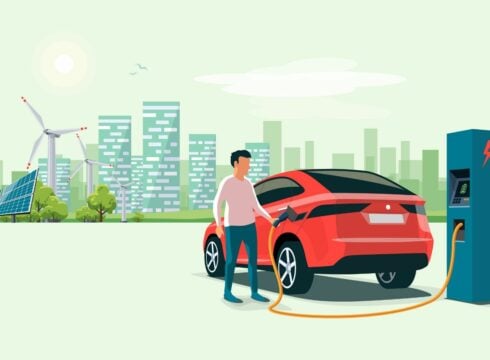The proposal drafted by Niti Aayog is likely to be reviewed by the Union cabinet in the coming weeks
The proposal has also recommended incentives of $4.6 Bn by 2030 for companies manufacturing advanced batteries
5% import tax on batteries for EVs to continue until 2022, but will follow a subsequent 15% increase to promote local manufacturing
Inc42 Daily Brief
Stay Ahead With Daily News & Analysis on India’s Tech & Startup Economy
In a big push to promote the use of electric vehicles, the government has proposed to offer $4.6 Bn in incentives to companies setting up advanced battery manufacturing facilities as it seeks to promote the use of electric vehicles.
The proposal drafted by Niti Aayog is likely to be reviewed by the Union cabinet in the coming weeks, said a senior government official on condition of anonymity.
Niti Aayog’s proposals have among other things recommended incentives of $4.6 Bn by 2030 for companies manufacturing advanced batteries, starting with cash and infrastructure incentives of INR 900 Cr in the next financial year which would then be ratcheted up annually.
The proposal seen by Reuters also revealed that the government plans to retain the import tax rate of 5% for certain types of batteries, including batteries for electric vehicles, until 2022, but will increase it to 15% thereafter to promote local manufacturing, the document said.
Though keen to reduce its oil dependence and cut down on pollution, India’s efforts to promote electric vehicles have been stymied by a lack of investment in manufacturing and infrastructure such as charging stations. Just 3,400 electric cars were sold in the world’s second-most populous nation during the last business year, compared to sales of 1.7 million conventional passenger cars.
The policy could benefit battery makers such as South Korea’s LG Chem and Japan’s Panasonic Corp as well as automakers who have started building EVs in India such as Tata Motors and Mahindra & Mahindra.
The proposal estimates it would cost firms some $6 Bn over five years to set up manufacturing facilities with the support of government subsidies.
Electric Vehicle Adoption In India
According to Inc42Plus, ‘Electric Vehicle Market Outlook Report 2020,’ electric vehicles are projected to have a market share of 70% and 20% in commercial vehicle and two-wheeler segments by 2030.
The report also revealed that the transactional market size of electric vehicles is expected to be $7.2 Bn in 2026 and 2030 respectively, with 97% of total EV transactions to be in the commercial vehicle segment by 2030.
Note: We at Inc42 take our ethics very seriously. More information about it can be found here.


